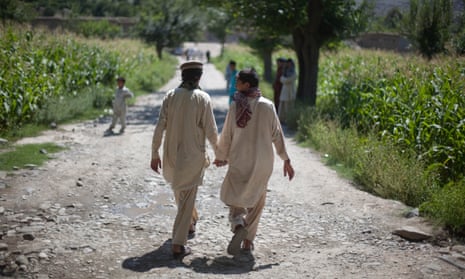Two people have been detained by Afghanistan’s intelligence services after they exposed a paedophile ring operating in some of the country’s schools.
Human rights organisations and the former president Hamid Karzai have called for the immediate release of Mohammed Mussa and Ehsanullah Hamidi, both well-known human rights defenders from Logar province, who were picked up by the National Directorate of Security last week when they were on their way to meet with the EU ambassador in Kabul.
Hours before his detention Mussa told the Guardian how he had been receiving threats and believed he was under surveillance by Afghan security services after his civil society organisation, the Logar Youth, Social and Civil Institution, revealed they had uncovered the abuse of at least 546 schoolboys.
Afghanistan’s Ministry of Education said it had launched an urgent investigation after the Guardian reported earlier this month that boys from six schools in Logar province had been abused, after more than 100 videos were discovered on a Facebook page, since taken down.
The revelations sparked a national debate on child abuse involving members of parliament and civil society.
The education minister tweeted last week that he had “met the governor of Logar, the MPs, chair of provincial council and other influentials from this province to assess and study the accusations.”
The ministry spokesperson Nooria Nazhat told the Guardian: “We are taking any schoolchildren abuses very seriously and have zero tolerance for such issues.”
Rahman Rahmani, speaker of Afghanistan’s House of the People, described the alleged child abuse as “appalling”, and called for the punishment of the perpetrators.
But some have been outraged by the accusations. In Logar’s capital, Pul-i-Alam, groups of men took to the streets on Saturday to protest against the claims.
Logar’s governor Mohammad Anwar Ishaqzai has denied the abuse allegations are true. Nazhat said that he considered the Logar findings “inaccurate”.
MP Sayed Ahmad Khadem said: “Some countries, some advertising networks, are trying to destroy this great and heroic nation.”
Zabiullah Mujahid, a Taliban spokesperson, said in a WhatsApp message that the abuse “is not happening in areas under our control. This is the kind of unrest going on in areas under the Kabul administration.”
Calling for the release of the men, Samira Hamidi, south Asia campaigner at Amnesty International, said today: “Afghanistan’s intelligence agency must release these human rights defenders immediately. While in custody of the National Directorate for Security, they are at risk of torture and other ill-treatment. Rather than punishing them for speaking out against these horrific crimes, the authorities should praise them for their work and hold the suspected perpetrators accountable through fair trials and without recourse to the death penalty.”
One survivor of the abuse, Daud, 18, said that many of the boys were living in fear. “Logar’s people stand against us,” he said. “They started a strike. I am very scared and others are too.”
Some of the victims have been murdered, by their families or unknown perpetrators, after being identified as victims.
The group claimed the perpetrators of the abuse were teachers, local authority figures and older students, as well as extended family members.
Many of the boys have since changed their phone numbers, while others have left Logar for other provinces. Mussatold he Guardian last week that he had been subject to threats and had been forced to move for fear of retribution.
Male sexual abuse is widespread in Afghanistan and the country has a long tradition of bacha bazi dancing boys who are often made to dress like girls and are forced into sexual relations with older men.
Despite its own efforts over recent years to investigate child abuse, the Afghan Independent Human Rights Commission said: “Research still shows that there are cases of child sexual abuse, especially of children in different provinces of the country.”
Afghanistan is deeply rooted in traditional values and many people put their family’s – and society’s – “honour” above all.
“Within communities, denial is a way to remove themselves from the stigma and the social ostracism that reports of such abuse carry,” said Charu Lata Hogg, executive director of the All Survivors Project. “What becomes central is not the suffering, trauma and violation that the boys suffer, but the social approbation which would diminish the respectability of that community.”
She said Afghan law criminalises sexual exploitation of children, but awareness of the issue is low, despite a presidential decree in March.
“Even those who are aware of it disregard it because of the overriding climate of impunity,” she said. “By admitting that boys are raped and that this form of abuse is rampant, officials would be admitting to not taking action against a violence that is not just unlawful, but also an unacceptable act under Islamic law.”
International bodies, including UN agencies, embassies and human rights lawyers have pledged to help the children who have come forward.
